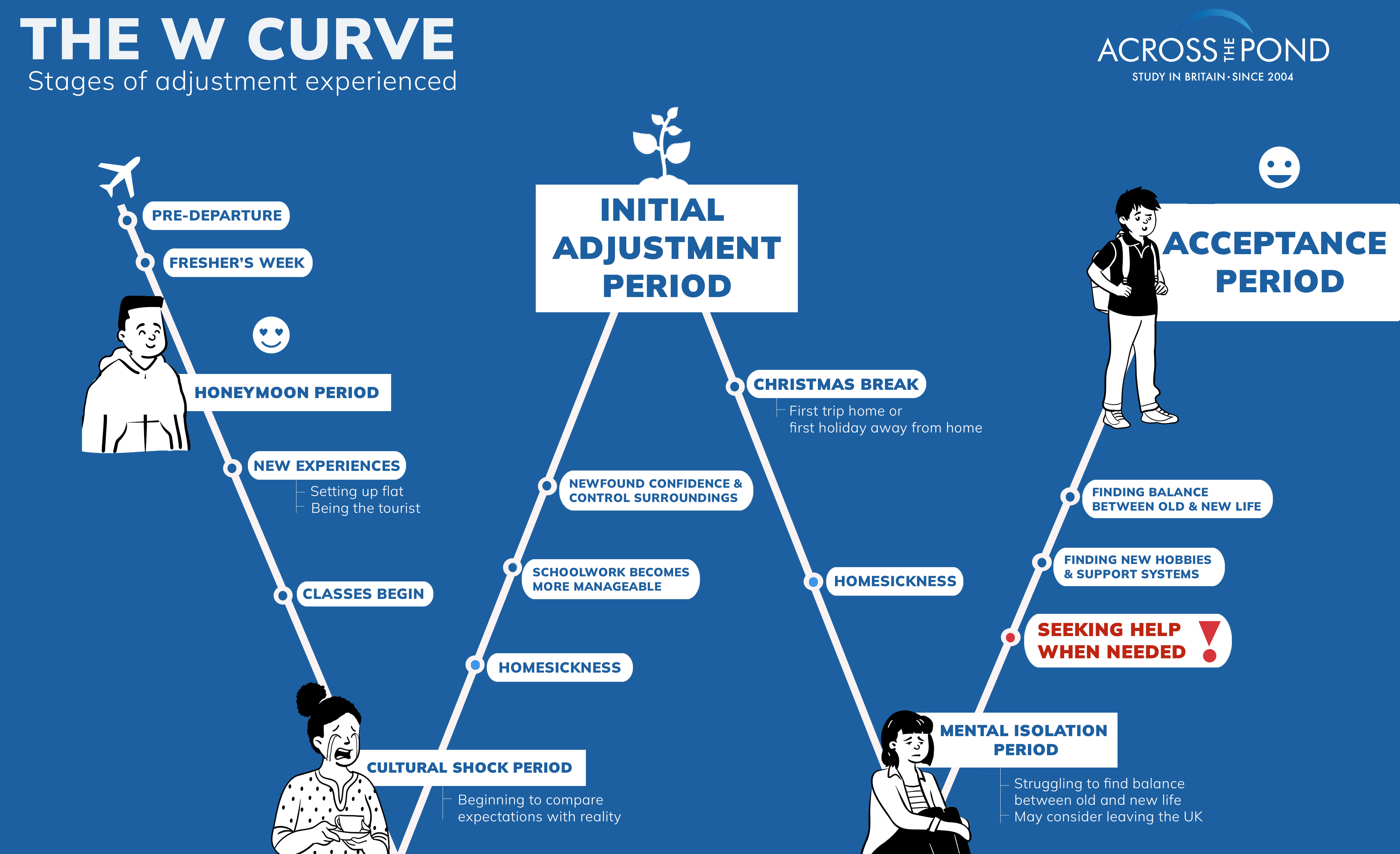
A UK Tour for Book Lovers
Written by Advisor Lauren - 25/07/2025
Of the many things the United Kingdom is known for, literature is one of the most universally recognized. From UNESCO cities of literature like Edinburgh, to the Bodleian library at Oxford, their history of writing and reading dates back centuries. While there are plenty of literary landmarks to check out while you’re in the UK, you can also check out these famous bookshops to purchase some books of your own, whether for studies or for enjoyment!
What better excuse to buy new books than for your own studies – whether you want to pursue a degree in English Literature, Publishing, Library Science, or any subject imaginable, Across the Pond can help you apply, so you can make your UK dreams a reality!
Follow along with our advising team as we take a tour of the many iconic bookshops all over the UK, and get some information for your own future studies!
Daunt Books
With several locations around London, Daunt Books has it all – historic charm, every book you need, and cute tote bags! Founded in 1990, their Marylebone location’s main hall is stunning, with glass ceilings and classic wooden shelves.
Topping & Company
Started in 2002 by Robert and Louise Topping, this limited collection of bookshops began in Cambridgeshire, and expanded to Bath, St. Andrews, and Edinburgh over the years. In Fall 2025, you’ll be able to check out their new location in York! They have a wide selection of titles, special editions, and signed copies!
Blackwell’s Bookshop
Blackwell’s is the place to go for all your academic books! With multiple locations across the UK, in 2022 it was bought by Waterstones, so while no longer an indie shop, some of their locations are still beautiful buildings. Visit their Edinburgh location, which is the city’s oldest book shop, dating back to 1848! You can spend hours getting lost inside Blackwell’s Edinburgh, and then wander down the street to the National Museum of Scotland.
Hatchards
Why not visit London’s oldest bookshop! Established in 1797, Hatchards has stood in Piccadilly for over two centuries. They also have a long association with the royal family – Queen Charlotte was one of their first customers! They have now expanded to hold a few locations throughout the UK, but the oldest is just a tube ride away if you’re studying in the UK capital!
Foyles
Founded by brother’s in 1903, Foyle’s is now a chain of seven stores across the UK (though they were recently purchased by Waterstones). Their shop once held the world record for the length of their bookshelves, and that’s the least of their quirky history. From the 1930’s onward, literary luncheons were hosted in their Charing Cross Road location, with many notable figures in attendance from the last century, including several Prime Ministers and the last Duke of Edinburgh.
Ullapool Bookshop
If you’re travelling to the Hebrides, stop over at the Ullapool bookshop on your way to the ferry terminal. A family run business dating back to 1946, they are a third-generation family business. Take a trip up to the Highlands, and if you time it right, you can also visit the Ullapool Book Festival, which happens every summer!
Barter Books
Opened in 1991 in the historic Alnwick railway station, this second hand bookshop is one of the largest in Europe. On display, you will find an original “Keep Calm and Carry On” poster from 1939 – one of the things that attract over 350,000 customers per year!
Leakey’s Bookshop
Located in Inverness since 1979, Leakey’s is a family run bookshop that specialized in second-hand and antique books. As the second largest second-hand bookshop in Scotland, you never know what you will find on their shelves! With winding staircases and shelves packed to the brim, this is a must see for your trip to the Scottish Highlands!
Rare Bird Book Shop
One of the newest shops on our list is Rare Bird’s Books! Located in the Stockbridge neighbourhood of Edinburgh, this bookshop specializes in books written by women. Pop in and discover new to your authors, take part in unique events, and join their book club! This shop prioritizes taking women’s writing seriously, but reading for fun.
The Poetry Pharmacy
Do you feel like some poetry will fix what ails you? Why not check out the Poetry Pharmacy in London, which will prescribe you the perfect bit of poetry for your situation. They have been dispensing poetry since 2011, with a second location joining the company soon!
No Alibis
If you’re a crime reader, check out No Alibis in Belfast! Trading for over 25 years, while they sell every genre of book, they specialize in crime and mysteries. Pay them a visit, and check out when of their many creative events, from concerts, to lectures and poetry readings!
Honourable Mentions:
While these may not be traditional UK independent book shops, check out these spots for all your bookish needs as well!
Shakespeare and Company
If you’re looking for a weekend trip abroad, why not take the Eurostar or a quick flight over to Paris and check out Shakespeare and Company in the 5th arrondissement! You’re sure to see many tote bags from this shop while in the UK, and when you’re so close, you might as well make the most of it!
The British Library
Who doesn’t love a bookshop, especially one of the most famous in the world? Check out the British Library while in London, and while you’re at it, check out their book shop, where you can find their exclusive special editions!
The Bodleian Library
Did you know that the Bodleian has a copy of every UK book printed? Founded in 1602, it is one of the oldest libraries in Europe, and the second largest library in the UK. Visit the library for the history, and the bookshop on the way out!
Hay-on-Wye
The world’s largest second-hand and antiquarian book town, check out their long list of bookshops for shopping second-hand! Take a weekend trip to Hay-on-Wye and wander the shelves of their shops, looking for rare finds and new gems, or visit for their one of their numerous events or yearly festival! Known as the “town of books”, it’s a destination for book lovers everywhere.
If you’re ambitious, you can likely visit all of these bookshops during your time in the UK! Leave us a comment if you visit any of our advising teams’ favourite shops, and let us know if we missed one of your favourite shops.
To find out more about studying in the UK, contact our advising team today!

Understanding Homesickness while Studying in the UK
Written by Advisor Brittany - 01/07/2025
What is the W-Curve?
Developed in the 1960s, the W-Curve model was proposed to help explain the feelings associated with culture shock. Since its initial proposal, it has been applied to the adjustment that university students face as they navigate this huge change in their lives. Moving away from home is a big adjustment for any student (whether they stay in Canada or choose to study abroad), so being able to navigate and understand the feelings that come up with such an adjustment is key to coming through the other side stronger.
Regardless of your expectations or prior experiences, it’s completely normal to experience ups and downs when adjusting to your new life in the UK. Understanding that others will be in the same position as yourself is going to be a huge factor when reflecting on your own journey and adapting to your new life so that you can try to avoid panicking and feeling as though a huge mistake has been made.

CLICK TO SEE VIEW FULL-SIZE IMAGE IN NEW TAB
*If you click to open the image, you'll be able to see the full W-curve. It will open in a new tab or browser window so that you can pull it up side-by-side and follow along while reading below.*
The “Honeymoon” Period
Students tend to enter this period before they’ve even left for the UK! Think about it – you’re anticipating your new adventure, and your mind is filled with exciting possibilities! You may be thinking about your programme, meeting new people, eating new foods, exploring new landmarks (being a tourist is fun!)
Similarly, when you arrive in the UK, you’ll be flooded with new student activities that bring on a new sense of independence. These could include participating in your university’s Fresher’s Week, meeting new students, setting up your bank account, moving into your new flat (especially if it’s your first time living on your own!)
The fist few weeks are a whirlwind and often leave little space for students to miss their home.
The “Culture Shock” Period
Once the excitement of your first few weeks wears down, you may start to think about your initial expectations of your programme, location, university etc. and start to compare those expectations with reality. In this stage it’s common to start comparing your experiences with others which may lead students to feel overwhelmed, isolated or homesick.
Some distress and confusion are common here while you question your choices and whether you belong in your new environment. Small differences in your new environment from what you’re used to may bring on further feelings of isolation as you examine cultural differences and familiar resources, or support systems may not be immediately available.
The “Initial Adjustment” Period
Once the initial culture shock passes students start to find successes in their everyday lives. Habits are being made/maintained, schoolwork becomes more manageable, bonds are being made with others and essentially a routine is being put into place.
Your new successes and growth in areas like mental wellbeing, social skills etc. will become more apparent, and students will then be brought back to the initial feelings of excitement. You’ll remember why you were so excited in the first place and start to regain a new confidence and control of your surroundings.
The “Mental Isolation” Period
This stage may occur closer to Christmas break or other academic breaks. Should you choose to go back to Canada and spend time with friends/family, you may find a sense of discomfort in the things you previously loved about home. It’s normal to feel somewhere in between as you navigate your new relationship between your old home and your new home.
It's completely normal to begin re-evaluating certain aspects of your previous life here, and even healthy to reconnect with your own values, as well as the parts of your culture or home country that are most important.
The “Acceptance and Integration” Period
As you continue your studies and start figuring out ways to help you succeed, you’ll regain a sense of confidence and control in your new life once again. You’ll develop better relationships with your peers and tutors and will likely get more involved within your campus environment. Perhaps taking up a new hobby or finding a support system of like-minded peers. Your new home becomes less intimidating, and more comforting as these bonds flourish and will be the cornerstone for maintaining a healthy balance between your old lives and new one.
Need help?
All universities have Wellness Centres and help available to students at different levels. If you’re struggling with mental health, home sickness, or adjustments as an international student, it’s important to know that resources are available to help. Speak to a friend, professor/tutor, university staff (via the international office or wellness centre) and be open to receiving assistance if needed.
You can also reach out to your Across the Pond advisor and we’ll be more than happy to help point you in the right direction for resources or contact information for your university.
While intentions may be good, parents encouraging you to come back or move home after a short time in the UK may not be as beneficial as you think in the long run. Seeking professional guidance can help you migrate these feelings and help you adjust to your new surroundings in a way that promotes growth and flourishing.
No two journeys are going to be the same, and that’s okay! Focus on your own journey and determine what you need to help you succeed in your studies.

Study Surrounded by History
Written by Advisor Brittany - 21/05/2025
One of the top reasons we hear from Canadian students on why they want to study in the UK is to be surrounded by the history and culture. Much of our cultural and national history is relatively "young" on the global scheme and certainly when compared with history of Britain. History and Archaeology students flock to the UK to embrace this long history.
The Roman invasion of Britain began around 43 AD (almost 2000 years ago). During this time, the Roman army increased its control over a significant amount of what is now England, Wales and Scotland. Their occupation required military defenses and the building of structures that have since been uncovered across the UK! These spectacular relics give a window into what Roman Britain was like.
Let’s explore a few key areas and their importance to the Roman occupancy.
York
During the Roman invasion, what is now “York” would have been referred to as “Eboracum”. What started as a fortress, the developed city would become the provincial capital that housed residents from throughout the Roman Empire!
In present-day York, several reminders of this powerful Roman occupancy are still present thanks to excavations and an effort to develop records of this period.
Of the excavations that have taken place over the past two centuries, Roman walls, several buildings, civilian houses storehouses and even a Roman bath house which can be explored in the cellar of a local pub.
In addition to the bath house, excavated Roman military headquarters are also open to the public and a section of the old city wall can be seen in the Museum Gardens. This portion of the wall is known as the Multangular Tower.
Want to explore study opportunities in York, read more here!
Chester
Archaeologists have uncovered a significant number of Roman structures in what is now Chester, England. Once a military town, the city of Chester contains remnants of Roman walls, several pieces of military structures, a Roman Amphitheatre and a Roman Garden. Much of these remnants are openly available for visitors to enjoy and have even been integrated into the modern development of the city itself.
The Roman walls surrounding Chester spanned over 2 km and date back to the very beginning of Roman occupancy. The walls were further developed by the Anglo Saxons and visitors to modern Chester can see parts of the wall beautifully maintained across different parts of the city. It is now a popular walking route with many virtual guides available to navigate the different sections.
A great example of this is https://chesterwalls.info/chestermap.html that provides maps in addition to further history about Roman Britain.
In addition to the walls, Chester is also the location of the largest stone-build Roman military amphitheatre in Britain! Located at the south-end of the walls, the amphitheatre has been partially excavated and is described as a ‘military’ type of amphitheatre. This would have primarily been used for training purposes due to its arena area being larger than its seating area when compared to other uncovered amphitheatres. Even so, the Chester amphitheatre would have also been open to general public for popular spectacle events including bull baiting among others.
Want to explore study opportunities in Chester? Speak to an Across the Pond advisor today!
London
Uncovered during the bombings of the second World War, London was once surrounded by a massive city wall during the Roman occupancy. Sections of this wall can be seen from the popular Tower Bridge to Farringdon.
Sections of the wall are scattered, but (if you know where to look for them) opportunities to walk amongst this historic construction provide a wonderful look into the past. Check out Historic UK’s City Wall Walking Guide when you’re in London!
Boudicca
Many will be familiar with the Tudor dynasty, but monarchs have been contributing to UK history for over 2000 years. There was queen who led a significant uprising against the (then) occupying Roman forces. Queen Boudicca was the queen of the Iceni people of Eastern England (what is now East Anglia). She’s been documented as a warrior queen and between 60-61AD her forces defeated numbers around 70,000 Romans and their supporters. While her forcers were defeated, Boudicca is remembered as a symbol of resistance. The site of Boudicca’s battle and final resting place are unknown, however there is a popular story that claims Boudicca’s final resting place is underneath platform 9 at King’s Cross Station.
You can visit a statue of Boudicca and her daughters at Westminster bridge, across the road from Big Ben and the Palace of Westminster.
Interested in exploring London university options? Our student advisors can help!
Thanks to archaeologists, many pieces of Roman Britain have been uncovered throughout the UK. Certainly not limited to the above, the remnants of this civilization provide a unique look into the influences of this powerful force. Combined with museums and other curated collections, make sure you add some of these excavated items to your itinerary during your time in the UK!
Just can't get enough learning about the rich history and culture of the UK? Maybe a degree in archaeology is for you!

Better than Fiction: Study in the Iconic Settings of your Favourite Novels
Written by Advisor Lauren - 21/05/2025
Have you dreamed of going to Hogwarts? Visiting Pemberley like Elizabeth Bennett? Walking through Birnam woods, imaging the final scenes of Macbeth? Why not study in the UK, where you can experience the iconic locations of some of society’s most beloved fictional stories, and live out the dreams as reality.
Follow along below as we go through some iconic literary settings, and their UK university equivalents! Our advising team would be thrilled to help you with your journey abroad.
Harry Potter
Perhaps the most well-known children’s book series, the Harry Potter books were written in Edinburgh. While you can’t study at Hogwarts itself, you can study in the Scottish Highlands – why not check out University of Aberdeen? With it’s castle like setting, the Scottish Highlands surrounding, and the opportunity to take a steam train like the Hogwarts Express, you can live out your Harry Potter dreams!
You can take a day trip to check out the locations that inspired Diagon Alley, the character names in Harry Potter, and the actual café JK Rowling wrote Harry Potter in!
Outlander
Do you dream of travelling back in time like Claire? Visiting Jamie’s printshop, or wandering around Lallybroch? You should study at Edinburgh Napier University! While the books are set in the Scottish Highlands, the filming locations you may be familiar with from the show are actually in and around Edinburgh! Visit Bakehouse Close to see Jamie’s printshop, Blackness Castle, Doune Castle, Falkland, Culross, Linlithgow Palace, Midhope Castle and more for the gorgeous locations of some of your favourite scenes. Edinburgh Napier is the perfect base to explore! You can tour on your own, or partake in one of the organized tours leaving from the Royal Mile, and even take a daytrip to the site of the Battle of Culloden.
Shakespeare
If you’re a Shakespeare fan, there are plenty of UK locations you can check out! Study at one of our many university partners in London, and visit the Globe Theatre to see a show!
If you’re a Macbeth fan, why not study at University of Stirling or University of Dundee, and check out Birnam Woods and Cawdor Castle! Both universities are both a short train ride away from those iconic locations, and you can immerse yourself in the stories of the past. A bonus for Stirling, the university is located in the shadow of the Wallace Monument, for any Braveheart fans! If you’re a fan of Beatrix Potter, Dundee is also a great location – her hometown and museum are not far!
Jane Austen
Does the charm of Regency Era England intrigue you? Do you dream of finding Mr. Darcy, or attending a ball? Why not check out a small university in England, such as University of Derby, where you can visit Chatsworth House, which posed as Pemberley in Pride and Prejudice? Or University of Sheffield, a short train ride away from Mansfield! Escape to the sea like Lydia Bennett, and attend University of Brighton!
If you study at the University of Winchester, you can visit Jane Austen’s final resting place in Winchester Cathedral. If you want to feel like you are studying in a grand manor house, check out Regent’s University – the climbing Wisteria is something straight out of Bridgerton!
Babel, A Discovery of Witches
If you’re a fan of more modern literature, like Babel by RF Kuang, why not check out Oxford Brookes University? Located in Oxford, it has significantly cheaper tuition, and students are able to use the Bodleian Library! Study through the night like Diana Bishop, or wander through town like Robin Swift.
Alternatively, if you want the old feel of a university, with the college system, prestige, and stunning buildings, check out Durham University! You’ll feel like an old-time scholar with all the modern amenities to give you an excellent education.
The United Kingdom has a rich history of literature – if your favourite isn’t mentioned, sign up for an advisor today to find out your university options to make your UK literary dreams come true!

What to Do with Your Pet While Studying Abroad
Written by Advisor Brittany - 30/01/2025
It can be hard to leave your furry friend behind as you embark on your new adventure, but ultimately there are a few reasons why it’s best to leave your pet behind (with family or a trusted friend/partner) while you’re in the UK.
-
Most university accommodation will not allow pets. This is because animals (especially dogs and cats) may cause allergies with some students. This does also typically extend to emotional support animals so do keep that in mind. Unless your pet is a registered service/guide animal, it is extremely unlikely that they would be allowed to stay with you on campus.
This would result in you looking off-campus for your accommodations (which can be tricky to secure as an international student, especially in your first year of study). Never assume the university’s policies! Do check with your UK university as soon as possible if you think you may wish to bring a pet with you to the UK. They may have staff on hand to help with questions. - Entering the UK can be stressful and expensive for both you and your animal! If you think you may want to bring your pet with you, it’s extremely important to review the official UK government guidelines as early as possible. You can do that here: Take a Pet Abroad (you’ll find Canada in the ‘part 2’ listed country list.)

If you’re thinking of taking a dog (for example), your dog may need to undergo several vet visits to ensure it meets the requirements for Canadian exportation and UK importation.
Shots have to be given at least 21 days before flying. Mostly, you will have to get a microchip implanted (if not already done), the rabies shots, and have your vet fill out the health certificate which you should be able to obtain from the UK government site.
It is extremely important to check the pet requirements for any airline that you’ve booked with (or plan to book with) as well! Many, if not all airlines are prevented from allowing pets in the cabin when landing in the UK. As these are long flights, being in the cargo area can be quite traumatic for animals.
Overall, we recommend leaving your pet at home while you’re abroad. As hard as it may be, there are some great ways to cope with missing your pet while you’re studying:
How to Cope When Missing Your Pet
Think of the positives!
If you do plan to go home in between semester breaks, or during the summertime, your time apart will actually be shorter than you think. The structure of UK semesters and breaks typically allows for longer breaks every 4 months or so. It’s still a long time, but you won’t necessarily be away for your entire degree!
You can also video chat with your pet (with the assistance of friends/family members) so that you can see/speak to them while you’re gone.
Many universities will bring local dogs to campus to help with student stress! If you see them on campus, they’re usually more than happy for some scratches.
Find part-time employment or volunteer with animals!
On a student visa, you can work up to 20 hours during term time. Why not find employment or volunteer at a local animal shelter? Some shelters will welcome the extra hands for things like dog walking. This is a great way to get some exercise, add to your resume, and spend some time with a new furry friend! 
Visit a cat café
These cafes are becoming increasingly popular! Many will highlight rescue animals, or have the animals up for adoption, but as a student you can head down for a cup of coffee and get some cat snuggles in while you’re at it! What better way to spend a few hours? Some options include:
Purrple Cat Cafe – Glasgow
Maison de Moggy - Edinburgh
Java Whiskers - London
Kitty Cafe – Leeds, Leicester, Nottingham, Birmingham
We understand that nothing can replace your furry friend at home, but while you’re completing your studies, there’s no reason why you can’t have a substitute to help get you by! Just think of all of the stories you can share with your pet when you get home!
More of a dog person? Book a session at a dog café instead!
These cafes usually have entrance fees to help continue providing the best environment for the dogs (anywhere from £5 - £10) . But really, who can put a price on spending time with these precious pooches? Make sure you review all policies prior to making your journey.
https://www.cuppapug.com/ - with locations in Manchester and London
https://dogandscone.com/ - Newcastle
https://edinburghchihuahuacafe.co.uk/ - Edinburgh





 Also look at what the university has in terms of facilities for your degree, especially if you’re studying something practice based. If you’re interested in Fine Art for example, find out if the university you’ve chosen has a set up for your chosen medium and access to the materials and tools you need to succeed. For this, an arts based school would be a great choice! They have campus buildings dedicated to every major they have, with top of the line equipment to help you succeed
Also look at what the university has in terms of facilities for your degree, especially if you’re studying something practice based. If you’re interested in Fine Art for example, find out if the university you’ve chosen has a set up for your chosen medium and access to the materials and tools you need to succeed. For this, an arts based school would be a great choice! They have campus buildings dedicated to every major they have, with top of the line equipment to help you succeed